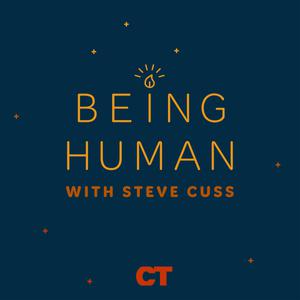
Being Human with Steve Cuss
Christianity Today
with Steve Cuss
- 41 minutes 14 secondsAuthentic Love and The Asbury Outpouring with Zach Meerkreebs
When Zach Meerkreebs finished preaching at a university chapel service February 8, 2023, he texted his wife to say he felt like his sermon hadn’t gone well at all. Four hours later, he wept into a voice memo, asking her to load up their kids and head his way as soon as possible. What we now know as The Asbury Outpouring was beginning.
Meerkreebs, a pastor and author, describes what it’s like to be part of a supernatural movement that takes on a life of its own. He and Steve talk about the shame many preachers feel after giving sermons they feel went poorly and how Meerkreebs has learned to steward his emotions in those moments. They talk about the vulnerability of grief, how God has met Meerkreebs at various moments throughout his life, and their hopes for the discipleship of Generation Z.
Resources mentioned in this episode include:
- Lower: Igniting Spiritual Awakening Through Radical Humility by Zach Meerkreebs
- The Asbury Outpouring
- Adrenaline and Stress: The Exciting New Breakthrough That Helps You Overcome Stress Damage by Archibald Hart
- The Toronto Blessing
- Awakenings
Learn more about your ad choices. Visit podcastchoices.com/adchoices
20 January 2025, 10:00 am - 34 minutes 2 secondsFour Dynamics, Three Relationships, Two Cohosts, and One New Year
Every human has three core relationships: to themselves, to others, and to God. Within those relationships, there are four dynamics that can infect them: assumptions, reactivity, predictable recurring patterns, and attempted solutions.
Listen in as Steve and Lisa Cuss start a conversation that explores these relationships and dynamics throughout 2025. The couple provides a high-level overview of each relationship and dynamic, setting the stage for upcoming episodes that will take deeper dives. They consider what the Lord’s Prayer and the Book of Job have to say about who we understand God and ourselves to be. Steve also gives a preview of guests soon to appear on Being Human, including Zach Meerkreebs, Kathleen Smith, and Ian Morgan Cron.
Resources mentioned in this episode include:
- Epiphany
- “It’s Friday But Sunday’s Comin! - Tony Campolo”
- Zach Meerkreebs
- Ian Morgan Cron
- Kathleen Smith
- Managing Leadership Anxiety: Yours and Theirs by Steve Cuss
- The Expectation Gap:, The Tiny Vast Space between Our Beliefs & Our Experience of God by Steve Cuss
- Capable Life
Learn more about your ad choices. Visit podcastchoices.com/adchoices
13 January 2025, 10:00 am - 14 minutes 43 secondsHosted by God at Christmastime
Whether our holidays are snowy or sunny—as they are for Steve Cuss as he records from Perth, Australia—the same thing is true: Christmas is a time to remember God’s nearness to us. Steve looks to the text of Luke 2, exploring Mary and Joseph’s journey to Bethlehem and their quest for a place to stay. He describes the meaning behind the Greek word philoxenia (“love of the stranger”) and the Hebrew word Immanuel (“God with us”) and considers what those terms may mean for Christians today.
Ultimately, Steve encourages listeners to recognize that God is the ultimate host—welcoming us with love into a forever family.
Resources mentioned in this episode include:
- Peculiar Treasures by Frederick Buechner
- “Six White Boomers”
- Philoxenia
- Immanuel
Learn more about your ad choices. Visit podcastchoices.com/adchoices
23 December 2024, 10:00 am - 37 minutes 39 seconds‘The Office’ Transforms Anxiety Patterns into Comedy
When the American version of The Office premiered on NBC in 2005, its all-star cast charged right through the fourth wall and looked the audience in the eye. The show’s unique style and cringeworthy stories didn’t just put a new kind of television on display—they explored anxiety in the workplace and relationships in a fresh, often embarrassment-fraught way.
As Steve Cuss and his son Andrew talk about the episode “Dinner Party”—arguably one of the most “I can’t keep watching this but I also can’t look away” moments of the show—they explore how the episode reveals anxieties and idiosyncrasies in the characters. They talk about enmeshment, detachment, and differentiation. Listen and consider how art often reflects our anxieties back to us and can help us better understand them.
Resources mentioned in this episode include:
- The Office
- “Dinner Party”
- Friedman’s Fables by Ed Friedman
- “Anxiety Is on the Runway in ‘The Devil Wears Prada’”
Learn more about your ad choices. Visit podcastchoices.com/adchoices
16 December 2024, 10:00 am - 28 minutes 24 secondsAnxiety Walks the Runway in ‘The Devil Wears Prada’
What do a high schooler’s senior year and the offices of a high-fashion magazine have in common? Stress.
During a discussion of The Devil Wears Prada, Steve Cuss and his college-bound daughter, Kaylee Cuss, talk about the anxiety on display in the iconic Meryl Streep film. The two talk about how Streep’s character, Miranda Priestly, may be the one in charge, but she’s arguably also the most anxious. They talk about trying to fit into existing systems, high emotions in the workplace, and relational enmeshment. Tune in for a heartfelt, insightful discussion of failure, success, and taking care of the relationships that matter most.
Resources mentioned in this episode include:
Learn more about your ad choices. Visit podcastchoices.com/adchoices
8 December 2024, 10:00 am - 35 minutes 19 secondsAirport Anxiety and Purposeful Publishing with Joy Allmond
When Joy Allmond was fresh out of college, she struggled to find a professional role in her field. She decided to make the most of her young, single years and became a flight attendant. The Lord used that experience to broaden her perspective—especially when she staffed one of the first flights to take to the skies after September 11, 2001.
Now, Allmond is the executive editor of Christianity Today. She and Steve talk about how airport behavior often reveals deeper feelings and what it takes to manage a crisis. They talk about the recent CT redesign, new content in the magazine, and Allmond’s hopes for CT’s future. Allmond shares her thoughts on the church at its best, experiences of feeling fully loved, and taking time to hear from the Lord.
Resources mentioned in this episode include:
- “We Can’t Worry Our Way to Peace”
- November/December 2024 issue of Christianity Today
- “CT Design, Redesign, and Re-redesign, from 1956 to Today”
- “Qualms and Proverbs” (CT advice column)
Learn more about your ad choices. Visit podcastchoices.com/adchoices
2 December 2024, 10:00 am - 27 minutes 24 secondsThinking Thankful Thoughts with Steve and Lisa Cuss
As the Thanksgiving holiday draws near in the US, Steve and Lisa Cuss reflect on the importance of gratitude. They talk about intentionally prioritizing the activities, people, and places that help us feel alive. Steve shares how keeping a Life Giving List has helped him through challenging faith seasons, and Lisa gives some practical examples for cultivating thankfulness in everyday life.
Steve and Lisa talk about the often emotional experience of gathering with family for holidays and how to develop a noticing frame of mind. They discuss political differences among loved ones, strategies for deepening our relational capacity, and the power of curiosity.
Resources mentioned in this episode include:
- Capable Life Free Resource Dashboard (includes Life Giving List)
- “Enneagram, Anxiety, and What We Live For” with Jimmy Carnes
Learn more about your ad choices. Visit podcastchoices.com/adchoices
25 November 2024, 10:00 am - 35 minutes 1 secondA Listener Q&A with Steve and Lisa Cuss
How can Christians know if they are managing their relationships in a healthy way? What does it look like to treat people with mental health disorders lovingly and respectfully? When should parents of young adults speak up, and when should they let their children learn on their own?
These are the types of inquiries that you, listeners of Being Human, have shared with us. Listen as the Cusses answer:
- What are family systems theory and internal family systems theory, and how do they relate to faith?
- How can Christians discern between healthy, gospel-based differentiation of self and becoming detached or cynical?
- How can leaders operate so that those around them can air their differences without dumping all their projections onto the leader?
- What does it look like to navigate settings where an individual’s mental health struggle is setting the tone for a group?
- Since most well-meaning laypeople are not trained therapists, what is the church’s role in dealing with mental illness?
- What are some words of wisdom for parents whose children will soon exit their teen years and enter young adulthood?
Resources mentioned in this episode include:
- Bowen family systems theory
- Internal family systems theory
- A Failure of Nerve: Leadership in the Age of the Quick Fix by Edwin H. Friedman
- Borderline personality disorder (BPD)
- “Introducing ‘Being Human with Steve Cuss’”
- Managing Leadership Anxiety: Yours and Theirs by Steve Cuss
- The Expectation Gap: The Tiny, Vast Space between Our Beliefs & Experience of God by Steve Cuss
- Capable Life
Learn more about your ad choices. Visit podcastchoices.com/adchoices
18 November 2024, 10:00 am - 30 minutes 54 secondsA Central Park Slow Down with Steve
Being fully seen and fully known can feel, in a word, terrifying. And yet, that’s exactly what our souls crave—and exactly what God designed for us to experience.
From the Sheep Meadow of New York City’s Central Park, Steve Cuss explores the idea of being entirely ourselves. He considers the two protective extremes that often keep people from being fully human: pretense and pretending. Cuss walks through 1 John 3:19–20, which describes being vulnerable in the presence of a God who is greater than our hearts that condemn us. He looks at Jesus as the preeminent example of being exactly ourselves, shares stories from his time as a chaplain, and offers practical steps for remaining loving and curious in relationships.
Resources mentioned in this episode include:
- The Meaning of Marriage: Facing the Complexities of Commitment with the Wisdom of God by Timothy Keller with Kathy Keller
- Capable Life Intensives
Learn more about your ad choices. Visit podcastchoices.com/adchoices
11 November 2024, 10:00 am - 40 minutes 7 secondsWalking the Camino de Santiago with Barrett Harkins
Five years ago, Barrett Harkins walked Spain’s Camino de Santiago—an ancient Christian pilgrimage walked by over 500,000 people each year—for a friend’s birthday. Somewhere along the path, he called his wife and asked what she thought about moving there.
Now a missionary in Santiago, where he works with pilgrims on the path and at a hostel, Harkins and Steve Cuss walk the path together. They talk about the power of slowing down and the profound conversations that take place as people journey with one another. They explore what God does in temporary spaces, what it looks like to let go of what we no longer need, and why it is important to create a reflective mind.
Harkins discusses the history of the Camino, the reasons people walk the path, and the way many pilgrims—including Harkins—have found it to be a place where God meets them in their anxiety and offers transformation.
Resources mentioned in this episode or recommended by the guests include:
- Camino de Santiago
- “The Power of Pilgrimage with Brian and Peri Zahnd”
- Three Mile an Hour God by Kosuke Koyama
- John Mark Comer
- The Enneagram
- Striking Out: Poems and Stories from the Camino by Stephen Cottrell
Learn more about your ad choices. Visit podcastchoices.com/adchoices
4 November 2024, 10:00 am - 43 minutes 55 seconds‘Healing What’s Within’ with Chuck DeGroat
Chuck DeGroat’s name has become somewhat synonymous with work on narcissism in the church. But as he and Steve Cuss discuss, DeGroat is devoted to shining a light on wholeheartedness and internal integration.
DeGroat and Cuss talk about anxiety—specifically around dying—and the way that age often brings with it a concern for one’s legacy. They talk about experiencing pain through work in church settings, noticing emotions that arise in ourselves and others, and coming home to God and ourselves—all while considering the impact of secondary trauma on people in pastoral and helping professions, ways to distinguish between shutdown and rest, and our response to the invitation of God.
Resources mentioned in this episode or recommended by the guests include:
- Chuck DeGroat
- Healing What’s Within: Coming Home to Yourself—and to God—When You’re Wounded, Weary, and Wandering by Chuck DeGroat
- Wholeheartedness: Busyness, Exhaustion, and Healing the Divided Self by Chuck DeGroat
- When Narcissism Comes to Church: Healing Your Community From Emotional and Spiritual Abuse by Chuck DeGroat
- “Narcissism In The Chair”
- Internal Family Systems model
- The Expectation Gap: The Tiny, Vast Space between Our Beliefs and Experience of God by Steve Cuss
- Managing Leadership Anxiety: Yours and Theirs by Steve Cuss
- “Always Beginners” by Thomas Merton
- Experimental Theology with Richard Beck
- The Enneagram
- Jesus, My Father, the CIA, and Me: A Memoir … of Sorts by Ian Morgan Cron
Click here to ask Steve a question.
Learn more about your ad choices. Visit podcastchoices.com/adchoices
28 October 2024, 9:00 am - More Episodes? Get the App
Your feedback is valuable to us. Should you encounter any bugs, glitches, lack of functionality or other problems, please email us on [email protected] or join Moon.FM Telegram Group where you can talk directly to the dev team who are happy to answer any queries.
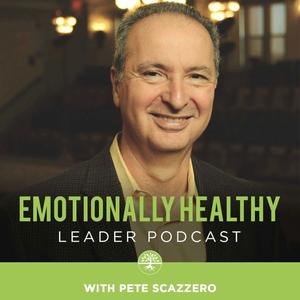 The Emotionally Healthy Leader Podcast
The Emotionally Healthy Leader Podcast
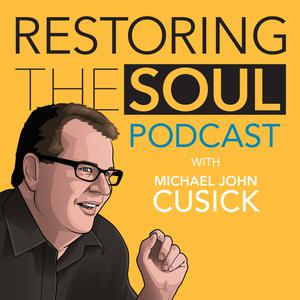 Restoring the Soul with Michael John Cusick
Restoring the Soul with Michael John Cusick
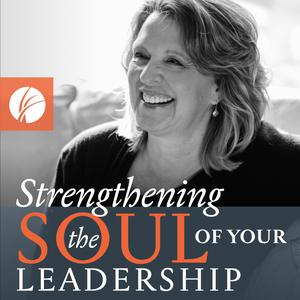 Strengthening the Soul of Your Leadership with Ruth Haley Barton
Strengthening the Soul of Your Leadership with Ruth Haley Barton
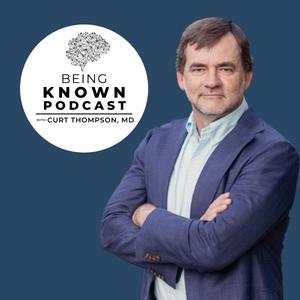 Being Known Podcast
Being Known Podcast
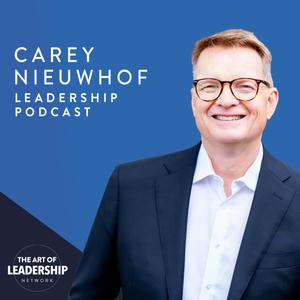 The Carey Nieuwhof Leadership Podcast
The Carey Nieuwhof Leadership Podcast
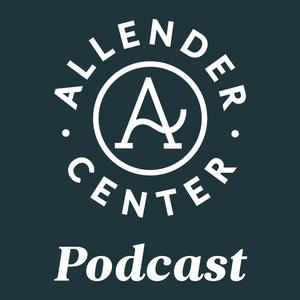 The Allender Center Podcast
The Allender Center Podcast